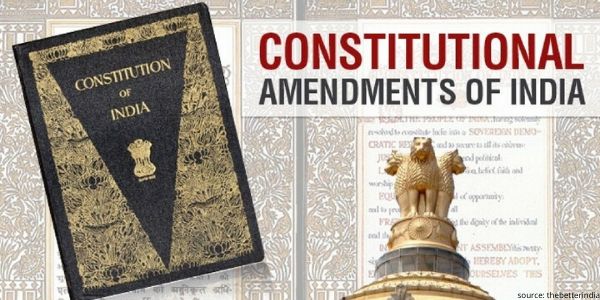Important amendments in the Indian Constitution
This article aims to delve into important amendments in the Indian constitution which have made a significant impact on the functioning of the state from the perspective of the SSC CGL/CHSL and banking examinations.
Amendment Bill in The indian Constitution
Article 368 of the Indian Constitution gives the executive of our nation the power to make amends to the constitution so that it can adapt to the present requirements.
Amendments of ordinary laws
The amendment of ordinary laws in our nation requires a simple majority in both houses of the parliament.
The bill to amend laws can be raised in either of the houses of the parliament (Lok Sabha or the Rajya Sabha)
Majority (more than 50%) of the total members of the house that are present and voting is required.

After a bill is passed in both houses, it is sent to the president for his/her approval.
Amendments of Fundamental rights, Directive Principles and other special laws
The amendment of the aforementioned laws requires a special majority in the parliament.
Special majority requires the approval of more than 50% of the total members of a house and approval of 2/3rd of the members that are present and voting.
When a matter concerning the federal structure is to be amended, a special majority along with approval of more than half of the state legislatures is required. Election of the president, extent of executive power, amends to the Supreme Court and High Court, distribution of powers between state and the center, representation of the states in the parliament and matter pertaining to any list on the 7th schedule is amended in this manner.
Read more: What are the basic properties & Concepts of sound?
Read more: A Brief Overview of the Banking and Finance sector of India
As of march 2019, a total of 103 amendments have been made to the constitution.
Some important Amendments in the Constitution
| Amendment No. | Date of Amendment | Changes |
| 1st amendment | 10th may 1951 | 1) Addition of a special provision for the advancement of backward classes.
2) Placing reasonable restrictions on freedom of speech. 3) Introduction of the 9th schedule |
| 6th amendment | 11th September 1956 | Amended the union and state lists with regard to raising taxes. |
| 7th amendment | 1st November 1956 | Amended the reorganization of states on linguistic lines and introduction of Union Territories. |
| 10th amendment | 11th august 1961 | Incorporation of Dadra, Nagar and Haveli as a union territory |
| 12th amendment | 20th December 1961 | Incorporation of Goa, Daman and Diu as a union territory |
| 13th amendment | 1st December 1963 | Formation of the state of Nagaland and adding special protection to it under article 371A |
| 14th amendment | 28th December 1962 | Incorporation of Pondicherry and creation of legislative assemblies for Himachal, Tripura, Manipur and Goa. |
| 25th amendment | 20th April 1972 | Curtailing of the fundamental right to property |
| 26th amendment | 28th December 1971 | Abolition of ‘Privy Purse’ paid to rulers of princely states |
| 31st amendment | 17th October 1973 | Increase in the size of the parliament from 525-545 seats |
| 36th amendment | 26th april 1975 | Formation of Sikkim as a state |
| 38th amendment | 1st June 1975 | Enhances the power of the president and the governors to pass ordinances |
| 42nd amendment | 2nd November 1976 | This amendment was passed during the emergency and curtailed fundamental rights, imposed fundamental duties and made India a socialist and secular republic. |
| 44th amendment | 6th September 1978 | 1st amendment after the emergency which aims to safeguard fundamental rights from the abuse of the executive and the legislative authority. |
| 52nd amendment | 15th February 1985 | Disqualification of members from the parliament in case of defection. |
| 55th amendment | 20th February 1987 | Formation of the state of Arunachal Pradesh |
| 56th amendment | 30th may 1987 | Formation of the state of Goa |
| 58th amendment | 9th December 1987 | Provision to publish an authentic copy of the Indian Constitution in Hindi |
| 61st amendment | 28th march 1989 | Reduction of voting age from 21 to 18 |
| 69th amendment | 1st February 1990 | To provide a legislative assembly and council of ministers to the union territory of Delhi. |
| 73rd amendment | 24th April 1992 | Provision for the set up of the Panchayati Raj as a 3rd level of administration in villages. |
| 74th amendment | 1st June 1992 | Provision for the set up of local administrative bodies as a 3rd level of administration in towns and cities. |
| 86th amendment | 12th December 2002 | Provides right to education as a Fundamental right up till the age of 14. |
| 93rd amendment | 20th January 2006 | Reservation of 27% for people of Other Backward Classes (OBC) in government and private institutions. |
| 101st amendment | 1st July 2017 | Introduction of the Goods and Services Tax |
| 103rd amendment | 12th January 2019 | A maximum of 10% reservation for Economically weaker sections of citizens of classes other than socially and educationally backward classes. |
For more such informative articles stay tuned to OWN Guru.
